

Formative assessment. Formative assessment, formative evaluation, formative feedback, or assessment for learning,[1] including diagnostic testing, is a range of formal and informal assessment procedures conducted by teachers during the learning process in order to modify teaching and learning activities to improve student attainment.
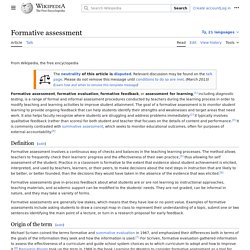
The goal of a formative assessment is to monitor student learning to provide ongoing feedback that can help students identify their strengths and weaknesses and target areas that need work. It also helps faculty recognize where students are struggling and address problems immediately. [2] It typically involves qualitative feedback (rather than scores) for both student and teacher that focuses on the details of content and performance.[3] It is commonly contrasted with summative assessment, which seeks to monitor educational outcomes, often for purposes of external accountability.[4] Definition[edit] Origin of the term[edit]
Summative assessment. Summative assessment, summative evaluation, or assessment of learning[1] refers to the assessment of participants where the focus is on the outcome of a program.
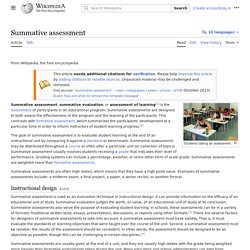
This contrasts with formative assessment, which summarizes the participants' development at a particular time. Summative assessment is widely taught in educational programs in the United States. [citation needed] Scriven claims that while all assessment techniques can be summative, only some are formative.[2] The goal of summative assessment is to evaluate student learning at the end of an instructional unit by comparing it against a standard or benchmark. Note, 'the end' does not necessarily mean the end of an entire course or module of study. Summative assessments are often high stakes, which means that they have a high point value. Instructional design[edit] Assessment for Learning at King's – Assessment and Feedback Strategies recommended by King's Academy.
Welcome to Assessment for Learning at King’s.
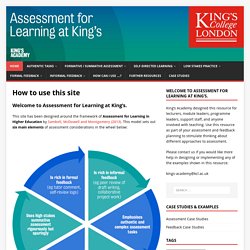
This site has been designed around the framework of Assessment for Learning in Higher Education by Sambell, McDowell and Montgomery (2013). This model sets out six main elements of assessment considerations in the wheel below: Each element above is reflected in the navigation links of this site: Each area contains: an explanation of the key principle/aspect of AfL,a range of assessment and feedback practices,examples of how these have been implemented (from King’s, the UK or international HE sector),key design questions to consider when redesigning assessment practices.
These practices can be used in formative or summative situations; this resource has a strong research-informed focus on the benefits of shifting the balance towards formative assessment. About this site. Assessment Planner - Future Learn. Webinar: Online Assessment. An Argument Against Allowing Test Retakes in High School. In my 21 years in the classroom, I’ve had experience with policies around allowing test retakes, dropping late work penalties, and prohibiting zeros.
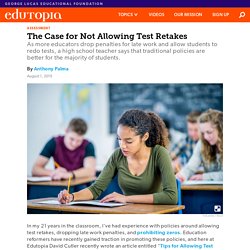
Education reformers have recently gained traction in promoting these policies, and here at Edutopia David Cutler recently wrote an article entitled “Tips for Allowing Test Retakes.” In my experience, however, the more lenient we are in these matters, the less students learn. The traditional policies—giving each assessment only once, penalizing late work, and giving zeros in some situations—help most students maximize their learning and improve their time management skills, preparing them for success in college and career. 3 Reasons Traditional Policies Remain Effective 1.
Dan Ariely, a behavioral economist who wrote a book on human decision-making called Predictably Irrational, has studied the power of deadlines. Deadlines and consequences for late work provide scaffolding for students to learn self-control. 2. 3. Peergrade - engaging student peer review. How to Do Formative Assessment in Distance Learning.
Whether we use synchronous or asynchronous online sessions, whether we call it distance or virtual learning, we’re all challenged to provide meaningful education experiences at a distance as the education world grapples with the impact of Covid-19.
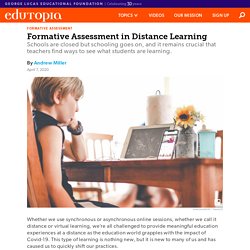
This type of learning is nothing new, but it is new to many of us and has caused us to quickly shift our practices. Formative assessment at a distance is challenging but possible, and we still need to check for understanding and provide meaningful feedback. The practices we use will look and sound different than they do in the classroom. Here are some ideas to consider. Formative Assessment at a Distance Know your purpose: There are so many tools to use to check for understanding.
Make sure the tools you use fit your purpose. Collect data over time: Formative assessment is a process, and it’s important to collect evidence of learning over time. You might ask students to submit reflection videos in Seesaw or send photos of their progress. Assessment.